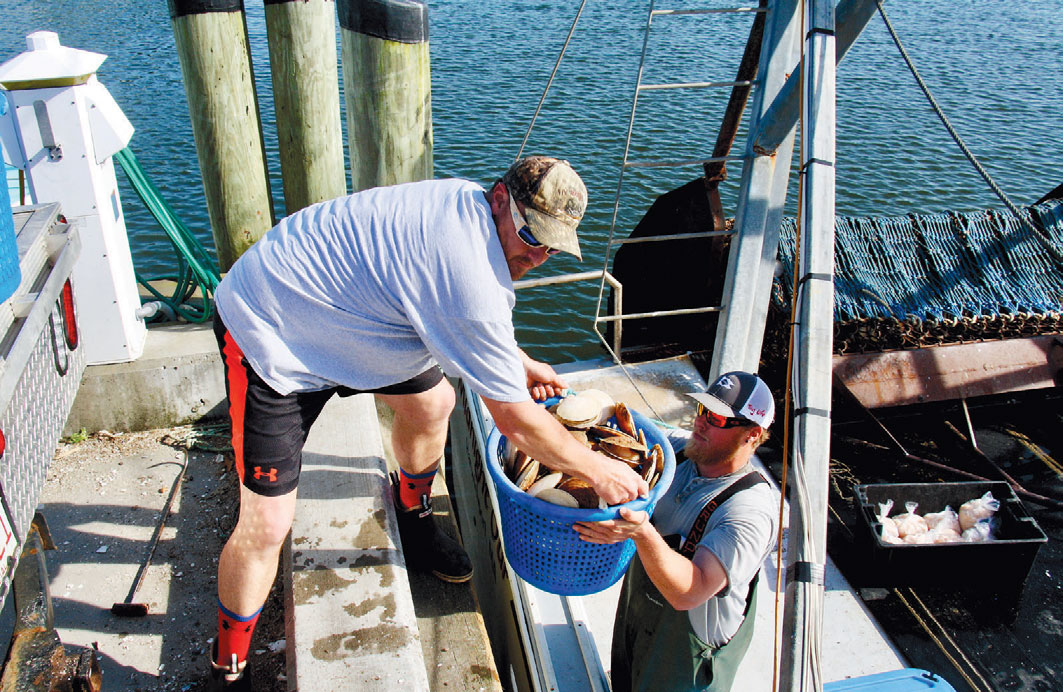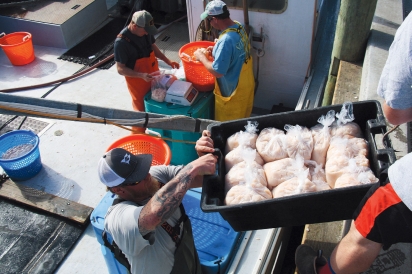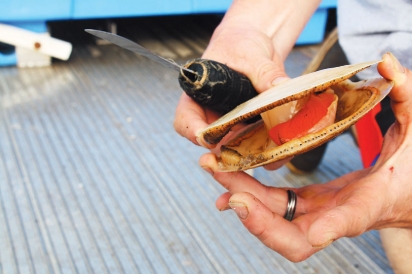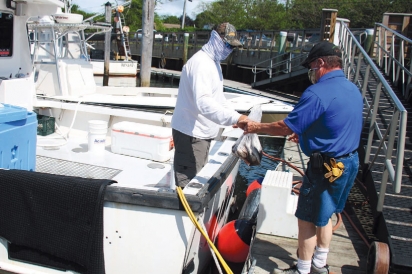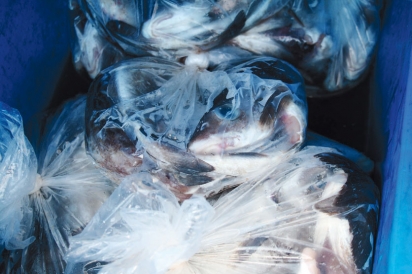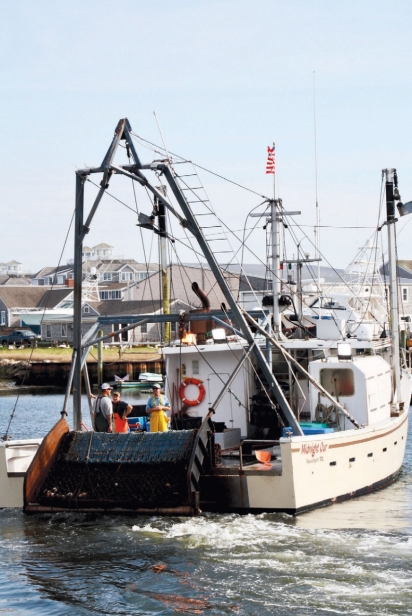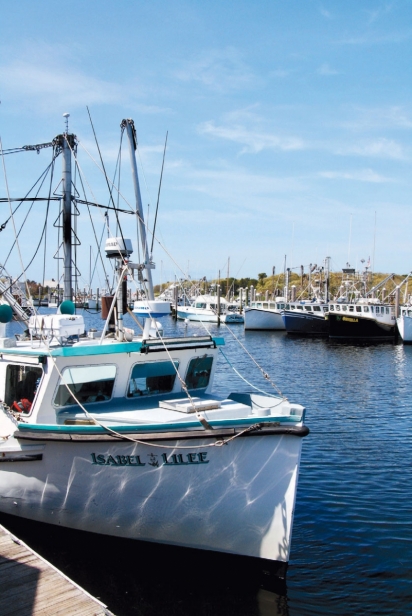This Just In: Dockside To Go
Successful commercial fishermen are nothing if not nimble. Maneuvering gear and working in concert with crewmates to harvest the day’s catch is a ballet that is performed while the dance floor continually pitches and rolls beneath the dancers’ feet. The deftness does not stop at the edge of the gunwale, however. For centuries, the Cape Cod fishing industry has needed that agility as forces beyond their control continue to shift faster than the sands of Chatham’s barrier beach.
Commercial fishing is the oldest industry in America, dating back to the Colonial times of the 1600s. In the four hundred years since the Pilgrims arrived aboard the Mayflower, there have been numerous challenges faced by the commercial fishing industry. Each one brought with it a need to adapt. Seth Rolbein, Director of the Cape Cod Fisheries Trust for the Cape Cod Commercial Fishing Alliance, says the history of fishing on Cape Cod is full of these moments and that the industry had to adjust time and again or they simply wouldn’t exist. “These small independent fishermen have needed to be savvy in not only catching the fish, but also finding the markets to sell to,” Rolbein explains.
The latest test comes in the form of a pandemic. The coronavirus had closed off traditional avenues of distribution for Cape Cod’s fleet. With restaurants closed, the supply chain began to break down almost immediately. Without nearly the same amount of demand, distributors and processors scaled back operations considerably. This, in turn, caused fish dealers, to whom the fishermen sell their catch, to no longer purchase the same volume. “It seemed like within 24 hours everything changed,” Seth remembers. According to Rolbein, the commercial entities number in the hundreds across Cape Cod in active ports from Sandwich to Provincetown, all left to wonder how their livelihood would continue. Add to that the number of commercial shellfish grants that dot the Cape’s coastline. “Shellfish grants are taking tough hits as well,” Seth explains. In their case, they have the product (oysters) ready for sale, but as time wears on the oysters continue to grow. “If they can’t move them soon, they’ll get too big,” he says. “The market isn’t used to large oysters.” This can result in oyster grants selling off their product for a fraction of what they would normally receive for their premium product. Something, even pennies on the dollar, is better than nothing at all.
While fish markets have seen a swell in business with people cooking at home a lot more, it still doesn’t replace the lost revenue from the closures. A different method of selling to the public was needed, and dockside sales started to take hold. The ability for a boat to sell its catch directly to consumers at the dock is nothing new. The “boat retail” permit has long been in existence, yet many boats never used it. It was easier to sell to fish dealers in the bulk quantities to which they were accustomed. With the sudden change to the business landscape, commercial captains needed to modify their operating procedures and sell directly from the dock. Realizing that time was of the essence, the Massachusetts Division of Marine Fisheries streamlined the process for which boats could receive their boat retail permits to within hours of application, and waived the requisite fees.
Once the regulatory hurdle of permitting was addressed, the real challenge was to find a market for their product. Fishing boat captains needed to familiarize themselves with aspects of business that until now, were not needed: marketing. Barnstable native Kevin Conway saw the need of connecting fishermen and their new potential client base and created the Facebook group “Cape Cod Local Seafood.” The page allows boats and consumers to connect and pre-order their request for the freshest finfish, shellfish and lobsters. “The support from the community has been awesome,” Conway states. The group gathered members rapidly. 1800 people joined within 24 hours, and in one month the ranks increased to 12,000. “I wanted to help out the fishermen and the community, so they knew where the freshest fish was available,” Conway points out while standing in the stern of his friend Brett Wilson’s boat Hindsight. Wilson, along with Conway, had just returned to Rock Harbor in Orleans with several hundred pounds of haddock, and was unloading them in five-, six- and ten-pound portions to the steady stream of people arriving to pick up their orders. Conway enjoys the reactions from the customers. “People will say, ‘I’ve been living here for twenty years and this is the freshest fish I’ve ever gotten,’ and we had one guy drive all the way from Falmouth for a pick-up,” he says. The growth in popularity of the Facebook group has given Conway the idea to make this endeavor a more permanent one. He created an entire website, capecodlocalseafood.com, where locals and tourists alike can get the freshest seafood available. It is an enterprise that may have been born from a dire situation, but Conway sees it as a way to continue to help consumers connect with suppliers long after things return to “normal.”
For Wilson, a charter boat captain, selling haddock at the dock has lessened the economic impact of the shutdown of his business, where he would normally have 300 charters in a single season. “This takes the sting out of it a little bit,” he explains. To be sure, it’s a much harder way to make much less money than he normally would. There are no nets or long lines with hundreds of hooks. There is only a rod and a reel with two hooks at the end of the line. On a good trip, Wilson and crew reel in 260-300 haddock. It’s an exhausting way of business, but one that needed to be done.
The process might have been streamlined for boat retail permits, but there are still regulations to be followed. Finfish such as haddock must be sold whole at the dock. The fish can only be cleaned (gutted) on board. Fishermen are not allowed to fillet the fish due to the stringent processing and handling requirements that need to be followed in only licensed operations. Those policies are also why all boat retail sales are permitted dockside only. The day’s catch can’t be transported without a properly licensed refrigerated truck.
Other boats’ catches are more readily consumer-friendly. Scallops are “ready-to-cook” when purchased. Jesse Rose and the crew of the Midnight Our fish for scallops year-round until their yearly quota of 60,000 pounds is met. Recently, the Midnight Our returned to Wychmere Harbor in Harwich Port with their daily allotment of 600 pounds of the tasty gems and weighed them out in two- or eight-pound containers or bags for the pre-placed orders of customers who wait anxiously for them. Thanks to the efforts of Jesse’s wife, Abby Our-Rose, and her marketing skills, and Kevin Conway’s Cape Cod Local Seafood, Jesse has a waiting list for his scallops. “It is tougher to deal with two-pound containers versus the 200-pound bags we’re used to dealing with,” Jesse admits. “But it is a nice change to talk with the customers. They love coming to the dock to pick up their scallops.” Growing up in Wellfleet in a family that has seen the ebbs and flows of life on the water, Jesse appreciates the historical connection this new method of business brings. “Selling off the boat is the way it used to be,” he recalls.
Scallops, unlike finfish and lobsters, are regulated by both the Massachusetts and National Marine Fisheries. Getting two governmental agencies to spring into action? That’s exactly what happened. “To get both the state and federal fisheries to act that fast was mind blowing,” Rose marvels. The federal agency issued their approval within two days in late April. Historically, there hasn’t been a boat retail permit for scallops like there has been for finfish. Currently, scallops are the focus of a pilot program to further assist fishermen in playing a bigger role in farmers’ markets.
The demand was immediate once Abby got the word out about the scallop sales. “In seven hours, we pre-sold 800 one-pound orders,” Jessie recalls. With the added logistical elements of selling their catch this way, dockside sales have become family affairs for many boats, and the Midnight Our is one. Abby handles the social media updates, taking the orders and managing the wait lists. At the dock, Jesse, Abby and the kids (son Shorey, 10 and daughter Stella, 7) all chip in to complete the sales and order fulfillments.
Creativity is an essential element when it comes to adaptation. Novel approaches oftentimes can lead to newfound success. Denice Lapierre continues to add new wrinkles to further market and sell the scallops that her husband Chris Merl’s boat, the Isabel & Lilee, bring to the dock. Having customers pre-pay for their orders allows Denice and Chris to deliver the packaged orders to a scheduled pickup location. This helps the Isabel & Lilee adhere to the tight off-load times that harbors may impose. Denice went so far as to acquire a refrigerated van to ensure the scallops’ freshness.
Another bit of brilliant marketing is to host online cooking classes through Isabel & Lilee’s Facebook page. Lapierre joined forces with her dear friend chef Michele Grillo to offer different ways of preparing scallops to keep things interesting. “Scallops are very rich,” Denice explains. “Things can get boring if you cook them the same way every time.” It’s also a great way to stay connected with current and future clients. “People are really curious about fishing and are looking for ways to support us,” she says.
When it comes to the Isabel & Lilee, it’s another case of “all hands on deck.” Denice and Chris have enlisted the help of their kids Isabel, Lilee and Aidan. “I remember thinking, ‘we’re not going to miss out,’ so we’re ‘on’ all day,” Lapierre exclaims.
It’s often said that it’s not the size of the fish but the fight in the fish. There’s no greater force than the will to live. Fish will battle with every last ounce of energy in order to survive. In much the same way, the commercial fishermen of Cape Cod continue the fight, ducking the blows they can and absorbing those they can’t. All the while, they keep moving, fighting and surviving. They reinvent their protocols, and in the process, their businesses and themselves.
capecodlocalseafood.com
hindsightsportfishing.com
F/V Midnight Our midnightourseafood.com
F/V Isabel & Lilee capecodscallop.com


